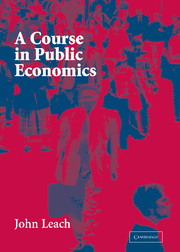Book contents
- Frontmatter
- Contents
- List of Figures
- Preface
- 1 Introduction
- Markets
- Externalities
- Public Goods
- Imperfect Competition
- Taxation and Efficiency
- Asymmetric Information and Efficiency
- 19 Asymmetric Information
- 20 Preference Revelation
- 21 Regulation of a Natural Monopoly
- 22 Other Examples of Asymmetric Information
- Asymmetric Information and Income Redistribution
- A Note on Maximization
- References
- Index
21 - Regulation of a Natural Monopoly
from Asymmetric Information and Efficiency
Published online by Cambridge University Press: 06 July 2010
- Frontmatter
- Contents
- List of Figures
- Preface
- 1 Introduction
- Markets
- Externalities
- Public Goods
- Imperfect Competition
- Taxation and Efficiency
- Asymmetric Information and Efficiency
- 19 Asymmetric Information
- 20 Preference Revelation
- 21 Regulation of a Natural Monopoly
- 22 Other Examples of Asymmetric Information
- Asymmetric Information and Income Redistribution
- A Note on Maximization
- References
- Index
Summary
It was argued in Section 18.2 that, if taxes are distortionary, the best policy for regulating a natural monopoly has three components:
If the monopoly incurs a loss, the government should collect extra tax revenue to cover the loss.
If the monopoly earns a profit, the government should appropriate the profit and reduce the revenue raised through taxation by an equal amount.
The pricing of the monopoly's output involves a trade-off. As the price rises above marginal cost, fewer units of the monopoly's good are purchased, and less consumer surplus is generated in the monopoly's market. However, the monopoly's profits rise, so less revenue needs to be raised through distortionary taxes. The decline in the welfare cost of the tax system means that more surplus is generated elsewhere in the economy. The regulator should choose the price that maximizes total surplus.
The model on which this policy was based neglects the role of management. Energetic and effective management will be reflected in lower costs, while lax management will result in higher costs. But if management is important, the policy described above is unlikely to be optimal. Why should the managers strive for greater profits, if profits are appropriated by the government? Why should they avoid losses, if losses are automatically covered by the government?
If the regulator can directly observe the managers' behaviour, the answer to these questions is easy: the regulator can induce the managers to work efficiently by punishing lax behaviour.
- Type
- Chapter
- Information
- A Course in Public Economics , pp. 317 - 332Publisher: Cambridge University PressPrint publication year: 2003



